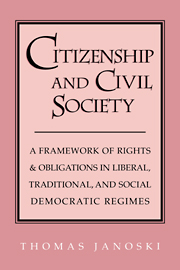 Citizenship and Civil Society
Citizenship and Civil Society Book contents
- Frontmatter
- Contents
- List of Figures and Tables
- Acknowledgments
- 1 Introduction to Citizenship
- 2 The Framing of Citizenship Rights: Expansion, Clarification, and Meaning
- 3 Reconstructing Obligations and Patriotism: Limitations, Sanctions, and Exchange in a System of Rights
- 4 Citizen-Selves in Restricted and Generalized Exchange
- 5 The Balance of Rights and Obligations through Nesting, Civil Society, and Social Closure
- 6 Incremental Change in Citizenship over Decades: Power Resources, State Structures, Ideology, and External Forces
- 7 Momentous Change in Citizenship over Centuries: From Wasps to Locomotives in the Development and Sequencing of Rights
- 8 Conclusion and Implications
- Notes
- References
- Subject Index
- Name Index
1 - Introduction to Citizenship
Published online by Cambridge University Press: 05 June 2012
- Frontmatter
- Contents
- List of Figures and Tables
- Acknowledgments
- 1 Introduction to Citizenship
- 2 The Framing of Citizenship Rights: Expansion, Clarification, and Meaning
- 3 Reconstructing Obligations and Patriotism: Limitations, Sanctions, and Exchange in a System of Rights
- 4 Citizen-Selves in Restricted and Generalized Exchange
- 5 The Balance of Rights and Obligations through Nesting, Civil Society, and Social Closure
- 6 Incremental Change in Citizenship over Decades: Power Resources, State Structures, Ideology, and External Forces
- 7 Momentous Change in Citizenship over Centuries: From Wasps to Locomotives in the Development and Sequencing of Rights
- 8 Conclusion and Implications
- Notes
- References
- Subject Index
- Name Index
Summary
There is no more dynamic social figure in modern history than
The Citizen.
For centuries now, [s]he has been member and motor
of rising social groups: of the urban propertied class in feudal society,
of the new industrial class in the eighteenth and nineteenth centuries …
of those who liberated themselves from dependence and deprivation – villeins and subjects, colonial dependents, minorities of many kinds, women.
Ralf Dahrendorf (1974, p. 673)The use of rights and citizenship has exploded with groups of many different types demanding and in some cases obtaining new rights. Many complain of a cacophony of rights claims and the comparative silence on obligations and duties to fulfill those rights. At the same time, immigrants in many countries clamor at the gates of industrialized nations with claims for a new citizenship that will socially and politically integrate them into a society with opportunities to live and prosper. Rights and duties are trumpeted and denounced with great emotion, diverse definitions, shallow usage, and uncertain relationships between concepts. What can citizens, politicians, and social scientists make of these claims for inclusion, obligation, and rights of citizenship?
Although most advanced industrialized countries cover nearly all of their inhabitants with at least some legal, political, and social rights, citizenship rights clearly remain contentious. Citizens and subjects demand rights, but their success depends on the ebb and flow of the power of contending political parties, interest groups, and social movements. Many libertarian conservatives and radicals see citizenship obligations as overly enforced, but communitarians and neo-conservatives see obligations as being in steep decline.
- Type
- Chapter
- Information
- Citizenship and Civil SocietyA Framework of Rights and Obligations in Liberal, Traditional, and Social Democratic Regimes, pp. 1 - 27Publisher: Cambridge University PressPrint publication year: 1998


